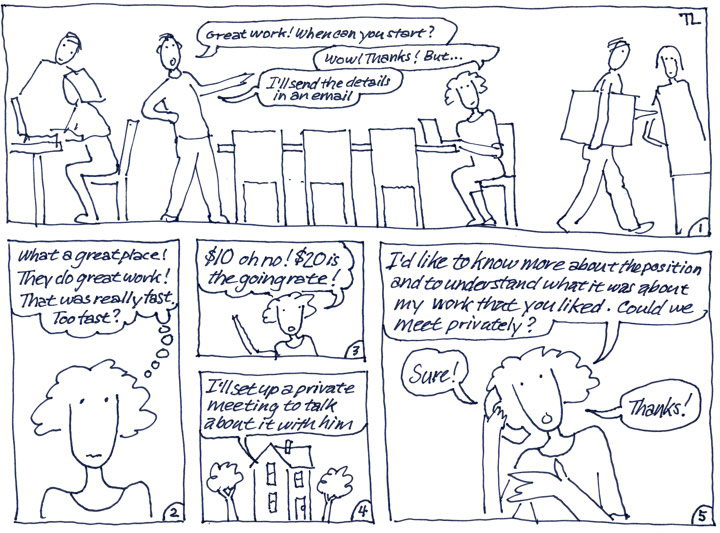As the song says, “You can’t always get what you want.”
Last month, Cora and I drafted a script for her to follow in her salary negotiations with a boutique brand consultancy. She wanted the position because they did exactly the kind of work she wanted to do. They were highly acclaimed and their clients included global brands and startups. The firm employed just three designers, a strategist and a production specialist. Cora felt that the small group would be easier to navigate as a beginner.
Just about to graduate, Cora had worked in retail and as a barista, but never as a designer in a professional setting. Although her work had received considerable notice in student competitions, she was very concerned about how she’d do in the “real world” and wanted to start in a small and, hopefully, friendly place.
SEE ALSO: Interview Advice for Millenials
Her visit to the firm had been hurried. In the interview, conducted in the center of the open studio, Jim, the owner, had taken only 30 minutes to review her work. He seemed friendly enough, had praised her work, but a subsequent email had offered her only $10 an hour, substantially below the $20 to $25 that fellow design grads were getting at her university. The more she thought about the meeting, the more superficial she felt his praise was. Also, she’d gotten no answers to her questions about what she’d actually be doing if she took the position.
The studio had no private space to meet. So, using the script, Cora called Jim and successfully arranged to meet him in a nearby coffee shop. She said that having the script while she made the call gave her a map of where to take the conversation, calming her nerves nicely.
She didn’t mention compensation during the call, only that she wanted more specific feedback on her portfolio, which he once again praised during the call, but without offering specifics.
Upon hanging up, she felt a wave of relief roll over her with the success of setting up the meeting. Ten minutes later this email arrived:
Cora,
Good to hear from you. Looks to me like you’re weighing your possibilities. Now that I think about it, I assume the only real point of needing to meet offsite is to ask for more money.
If that is the case, we can save some time in our busy schedules, because there are tons of people who wouldn’t hesitate to take the job for nothing.
Best,
Jim
Cora called me instantly: “At this point I feel like I am being taken advantage of. I checked again with classmates and not a single one was paid below $15 hour. The majority are paid $20. And his tone in the email was completely different than when we spoke over the phone. When we talked, he was friendly, encouraging and even seemed flexible. He was happy to set up the coffee date. I was over the moon when we hung up. What a turn-around.”
“Now, I don’t think the job’s right for me. I think I’m going to turn it down, but would appreciate your advice as to how to do it tactfully. I’m disappointed that it didn’t work out.”
“I can’t help but feel like I did something wrong, even though I know I didn’t. I think it’s that emotional response you spoke about.”
Disappointed, Cora wrote:
Hi Jim,
Maybe I miscommunicated. It wasn’t just the money I wanted to meet with you about. As a new designer, I value any opportunity to get constructive feedback on my work from professionals. I also wanted to know what my role would be at your firm and what specific opportunities the experience would provide.
But, compensation is a factor. In my previous internships and those of my colleagues, the range is $20-25. $10.00 an hour is lower than what I made when I worked in retail.
Our professors strongly advise against working for free.
I was excited about the intern opportunity you offered and am sorry it will not work out.
Best,
Cora
His response was simply:
It appears there was not a miscommunication if you think interns get $25 an hour.
Sent from my iPhone
In a subsequent call from Cora: “…so all in all, good riddance I think. Still, it’s disappointing. I love their work.”
Did Cora do the right thing? I think so. Simply by extending the conversation she learned a bit more about Jim than she would have if she’d taken the job without questioning him. Yes, she didn’t get what she wanted and she’s disappointed. Understandably so. Who wouldn’t be?
SEE ALSO: Why Did You Say You Bought This?
No matter how skillful of a negotiator you are you can’t control the other person. Cora did add to her self-respect by simply asking for what she needed. And, in my view, that step alone added to her ability to engage in a difficult and emotionally-challenging conversation and see it through to a conclusion.
“You can’t always get what you want. But if you try, sometimes you just might find you get what you need.”
